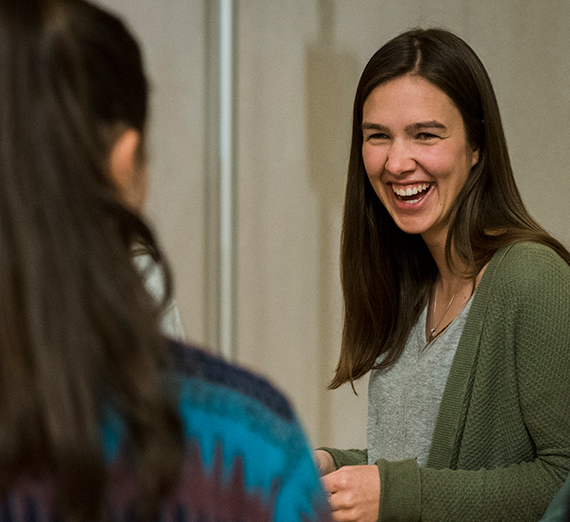Peer Educators Foster Deeper Learning

“How do we pursue knowledge and cultivate understanding?”
That’s one of the first questions asked in a first-year seminar, a single-semester course designed to guide students’ transitions from high school to university academics. Behind the scenes, three GU professors have integrated peer educators into their seminars, with the goal of fostering a deeper, co-learning experience for new students.
Scott Starbuck, a religious studies professor, teaches a first-year seminar called Psalms and the Human Condition. Molly Kretchmar-Hendricks, the University Core director and a psychology professor, teaches Risk and Resilience in Human Development, an interdisciplinary seminar. Assistant Professor of Philosophy Maria Howard teaches Loneliness and Community. Together with Kelly Alvarado-Young, director of First Year Experience Programs, these professors create mentorship opportunities between returning and first-year students.
The peer educators are not teaching assistants. Rather than evaluating the students’ coursework, they support students through their transitions into college academia, often acting as mentors and role models of deep learning. In the past, Kretchmar-Hendricks explains, peer educators have helped their first-year students ask critical, complex questions in class, consider the assigned readings through new lenses, find their own voices, and grapple with their senses of belonging on-campus.
“[Peer educators] can model a comfortableness as a co-learner that sometimes is difficult for freshmen to live into immediately. So, as mentors, the students can key off of them and notice how they deal with, for example, ambiguity,” Starbuck explains.
Starbuck and Kretchmar-Hendricks solicit peer educators through nominations from other faculty. During the 2018-2019 school year, they also teamed up with Alvarado-Young, who, through hiring new student orientation leaders, can easily identify those who are a good fit for the peer educator role.
Through the orientation leader training, Alvarado-Young says, peer educators gain valuable and applicable skills: for example, learning to talk about transitions and issues like sexual violence, facilitating small-group discussions, and connecting first-year students to the resources they need. Volunteering as peer educators, Starbuck adds, also ingrains in students the essential skills of independent learning, and defining boundaries when the responsibilities are not clearly-structured. He encourages the peer educators to act as observers and full participants in the course, offering the other students both emotional support and a model for intellectual engagement. Something Starbuck finds unique and wonderful about Gonzaga is this desire to participate in deep learning, both inside and away from the classroom setting.
“The insight of having a peer educator is to help the seminar take its own responsibility for learning, rather than just seeing the professor as the dispenser of information,” Starbuck says. “[I]t's helping us see that learning is more of a lifestyle. It doesn't simply happen in the classroom.”
Carson Chapman, a sophomore business major and former orientation leader, volunteered as a peer educator for Kretchmar-Hendricks’s seminar, Risk and Resilience in Human Development. Chapman viewed himself as a more reserved student, but he was interested in the mentorship aspect.
“I think mentorship is key in the transition between high school and college for freshmen. It's really important for them to have connections with one another and connections to resources, whether it's us or their professors,” Chapman explains. “[Mentorship] definitely decreases the stress that they have about being in an unfamiliar situation…It allows them to dive into the materials and be more comfortable in their environment.”
In addition to further developing their leadership skills, Kretchmar-Hendricks has noticed that students enjoy the opportunity to learn without the formal expectations of earning a grade.
Chapman confirmed this. “Because I wasn't being graded on the materials, I felt like I could engage in a deeper learning. “It allowed me to be more open and engaged with the content. I would definitely do it again, and I would completely recommend it to anyone who's looking for a leadership position that has a lot of mentorship involved in it.”
Furthermore, as peer educators and co-learners, Starbuck noticed his volunteers looking at the course content through new perspectives. Starbuck occasionally steps out of the classroom for a few minutes, allowing the peer educators to lead discussions of their own. This sometimes makes the first-years feel more comfortable.
“There's this biblical phrase that John the Baptist says about Jesus, that he had to decrease so Jesus could increase,” Starbuck says. “I think I need to figure out ways that I can decrease in the classroom, especially in terms of my professorial presence, so that students can really take responsibility for their learning.”
